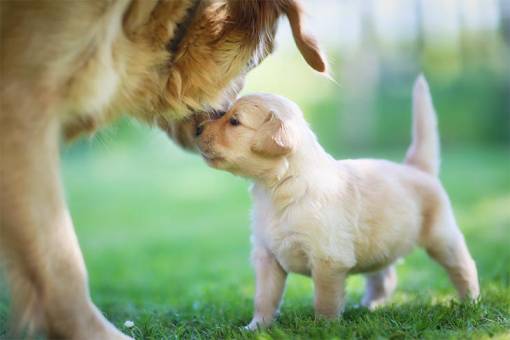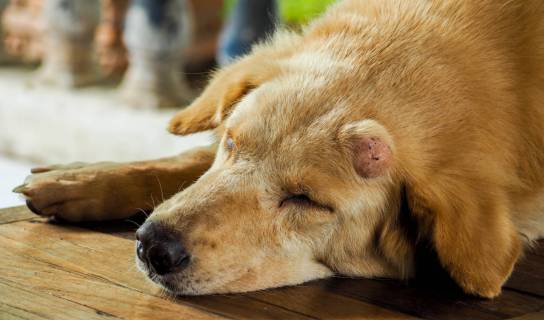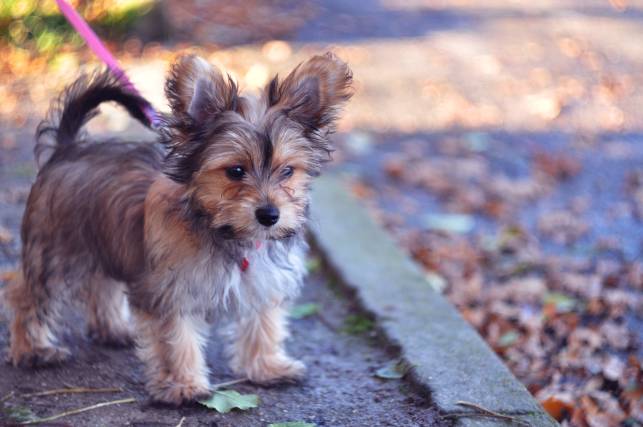Connect with a verified veterinarian in minutes. Licensed vets are available 24/7 to answer your questions. No need to worry about your furry family member.
Introducing a puppy to an older dog is that a good idea? There may be times when bringing a puppy into an older dog’s life brings many benefits. These include playing together, grooming one another, sometimes the older dog will become a little more active, and more. And two can keep one another company!
So, having a puppy and an older dog together could be a good thing. However, before introducing a puppy to your older dog, there are some things to consider.
Choosing a Puppy
When you go to choose a puppy to bring home, you may want to choose a puppy of the opposite sex of your older dog. This can help to reduce some of the territorial issues that can come with two dogs of the same sex.
Next, look for a puppy that has a personality that will go with your older dog’s personality. If your older dog is laid back and calm, then it may be best to choose a puppy with the same type of personality. However, remember that a puppy’s personality may not fully develop until they’re older. So, your calm, laid-back puppy could eventually become filled with energy and be much more outgoing! It may help to choose a puppy from a dog breed that’s more easy-going and calm when they reach adulthood.
Finally, you need to evaluate your own personality. As a pet parent to two dogs, you’ll be responsible for caring for two dogs, which means double the costs on pet food, vet visits, and more. Plus, you’ll have to deal with two souls who are completely dependent on you. Each one will need special care. It will take patience and understanding to help the dogs become used to one another, too. If you feel you’re up to the job, then read on!
Introductions are Important
It can be stressful to introduce a new puppy and your older dog, especially if you’re not an experienced pet parent. That’s OK! We’ve got some tips on how to make introductions easier and less stressful for everyone!
First, consider how your older dog is with other dogs. Is he friendly and do well with other dogs? Then chances are pretty good he will also do well with the new puppy. So, when introducing the puppy to your older dog:
- You’ll need another person to help you with the dogs.
- Meet in a neutral space, such as a friend’s home or their backyard. This helps to cut down on the territorial instincts of your older dog.
- Have both dogs on a leash, with you taking care of the older dog and the other person keeping the puppy on the leash.
- Allow both dogs to sniff each other over really well. This is a normal part of being social for dogs.
- There may be some excitement, which is completely normal. Your dog and puppy will need a little time to become acquainted. This is completely normal.
- Put your older dog’s favorite toys away to avoid resource guarding. Your older dog may not want to share his favorite toys and chews with the new puppy!
Most older dogs will make allowances for the exuberance of the puppy. However, remember the puppy may become too wild for your older dog. If this happens, your older dog may try to correct the puppy. This is also normal and should be allowed, as long as the older dog is not attacking the puppy.
Through the introduction period, never leave the two dogs alone, unattended. If you step out of the room, the worst could happen. To avoid this, always have the dogs supervised until you’re sure they are getting along very well.

Review symptoms, medications & behavior to keep your pets healthy with a Vet Online in just minutes.
Ask a Vet Live NowAfter the Introductions
Now that the initial introductions are over, you’ll need to monitor your senior pet’s body language. This will give you a clue as to how he’s dealing with the newcomer. What for these signs your older dog may be struggling with the stress of the new puppy:
- Prolonged stares
- Snarling
- Display of teeth
- Raised fur on the back of the neck and back
- Growling
- Hunched back
You may notice the puppy is trying to play with your older dog, even though your older dog is not happy. Puppies don’t know all the social cues yet and may need your help. About the only thing you can do if things look to get out of hand is to separate the two dogs.
It’s a good idea to have two separate rooms for each dog. This way, they will each have a spot where they can go to relax and calm down. Your older dog will appreciate a stress-free area where he won’t have to be badgered by the puppy, too.
Along with their own private space, always make sure that each dog has their own water and food bowls. Otherwise, you may have to deal with food aggression, which is never a good thing. So, make sure each dog has their own bowls to avoid this problem.
It’s also necessary to make sure both dogs have their own beds and bedding. Now, they may agree to switch with one another later. That’s OK! But your older dog shouldn’t have to share his bed with the puppy unless he decides to do so on his own. Respect your older dog’s needs, and he may adapt to the new puppy faster.
Further Tips
As the dogs learn to live with one another, it’s a good idea to make sure they’re supervised when they’re together. If you have to leave, make sure each dog is in a separate room, with the door closed.
Make sure to spend quality time with both dogs separately. You want to let your older dog know you love and treasure him. The same goes for the puppy.
Do let the dogs interact if they’d like to play. Just stay with them. Never leave them alone, at least in the beginning.
In the beginning, introducing an older dog and a puppy can be challenging. However, if you take the proper precautions. Remember to respect your older dog’s place in the home and continue to treat him with the love and care he needs and wants. And welcome the puppy with the same love and care.
It takes time, but eventually, your older dog and puppy will learn to live with one another. Then you’ll have a lively, fun-filled home!
Connect with a verified veterinarian in minutes. Licensed vets are available 24/7 to answer your questions. No need to worry about your furry family member.

Julie
Julie is a graduate of the University of North Carolina, Wilmington, where she studied Animal science. Though contrary to the opinion of her parents she was meant to study pharmacy, but she was in love with animals especially cats. Julie currently works in an animal research institute (NGO) in California and loves spending quality time with her little cat. She has the passion for making research about animals, how they survive, their way of life among others and publishes it. Julie is also happily married with two kids.
Review symptoms, medications & behavior to keep your pets healthy with a Vet Online in just minutes.
Ask a Vet Live Now




